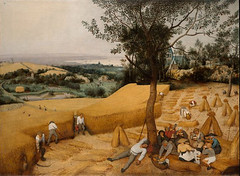MUS - Trusting and Tracking What Catches Your Fancy
 Monday, November 2, 2009 at 11:20AM
Monday, November 2, 2009 at 11:20AM 
I learned a text tag from a technical writer (I forget the context) that's stuck with me: "MUS," which stands for Might Be Useful. I love it for two reasons. First, it represents an active experimenter because she is aware and observing. You have to pay attention to grab things that MUS. Second, There's the underlying assumption or spark that spoke to you - "Pay attention to this (but I don't know why)." That's an act of faith, actually - what my divinity school graduate and Think, Try, Learn collaborator defines as hope without evidence.
Trusting that an items is important means, of course, you better capture it just in case it pans out. In my Big Arse repository (see My Big-Arse Text File - A Poor Man's Wiki+Blog+PIM) I have thousands of these, of which 90% won't pay off. But that's OK. It's like my talking a lot of photos - Just through random shots some of them will probably work out somehow. A key is efficient capture at the time - use whatever tools and hotkeys you like. It shouldn't be paper, though - too slow to encode and retrieve.
Key, also, is review. Similar to the practice of regularly looking back over your projects, you should see if any MUSes have become IDUes (Is Definitely Useful). I've struggled with how to bake the MUS review habit into my workflow, and now use opportunistic idea review: When I have to create something - an article or a presentation, say - I hit the file and search. Fortunately, I've consistently tagged things so that this works pretty well. Tracking Lessons Learned is an example, as is blogging.
As far as what makes this happen, I'd say it's the magic of being human. The unique combination of your mind, history, and how you've opened yourself to the world dictates what you see, and what you predict might be valuable. I guess it's our MUSe. What catches your fancy will change over time - my anti-library is littered with books I'll probably never crack. But when a gem shows up from my past self - boy is that gratifying.
I'm curious: (How) Do you pay attention to MUSes? What's your MUS repository like? How do you review it?







